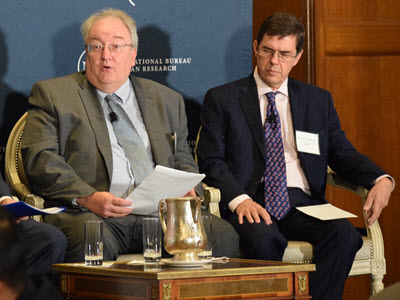Podcast
China's Responses to a Changing Security Environment
Phillip C. Saunders and Thomas G. Mahnken examine the global ambitions of the People’s Liberation Army and the strategic calculation behind its disruptive activities in the Indo-Pacific in the latest episode of NBR’s Asia Insight podcast series. The discussion, moderated by Abraham M. Denmark, took place at the Asia Policy Assembly on June 19.
Abraham M. Denmark is the Director of the Asia Program at the Woodrow Wilson International Center for Scholars and Senior Fellow at the Kissinger Institute on China and the United States.
Phillip C. Saunders is the Director of the Center for the Study of Chinese Military Affairs and a Distinguished Research Fellow at the Institute for National Strategic Studies at the National Defense University.
Thomas G. Mahnken is President and Chief Executive Officer of the Center for Strategic and Budgetary Assessments.
Time Stamps
[2:48] Moderator Abraham Denmark introduces the panelists and the topic.
[4:03] Phillip Saunders assesses how China’s policies follow an “adaptive” strategy.
[4:45] Saunders discusses how China’s policies go through periods of assertiveness and restraint not only to maintain “status quo” goals but also to make progress on “revisionist” goals.
[8:06] Saunders talks about China’s strategy to implement the country’s goals, through diplomatic, information, military, and economic means.
[11:20] Saunders explains China’s strategy to prevent confrontation with the United States, and how China may have misjudged the United States in recent years.
[16:43] Thomas Mahnken highlights four “dials” of the Chinese Communist Party (CCP) that raise concern for the United States.
[18:34] Mahnken introduces the first “dial”: the domestic versus international priorities of CCP leadership.
[19:37] The second “dial”: China’s interests in continental versus maritime domains.
[20:41] The third “dial”: China’s approach to maintain status quo versus revisionism.
[21:34] The fourth “dial”: authoritarian versus pluralistic tendencies of China’s political system.
[23:19] Mahnken offers recommendations for the United States to address China’s strategy.
[24:05] Mahnken gives his thoughts about a potential U.S.-China trade deal.
[25:18] Denmark asks Saunders and Mahnken what the key arenas of U.S.-China competition are and what successful competition in these areas looks like from an American perspective.
[26:34] Saunders emphasizes the importance of the Indo-Pacific region and maintaining alliances with countries in the region. He also talks about the ideological competition between China and the United States.
[29:12] Mahnken underscores how the competition is about the continued rule of the CCP, and how the CCP seeks to exert influence in a regional and global environment.
Related Event
Asia Policy Assembly 2019 was held on June 18–19 in Washington, D.C. Learn more.
About Asia Insight
The NBR podcast series Asia Insight features interviews with top Asia experts about key issues affecting the Indo-Pacific region, with a focus on implications for U.S. policy and businesses. Subscribe to Asia Insight on Podbean and Apple Podcasts and let us know what you think of the podcast on Twitter.
Media Contact: Dan Aum, [email protected] or (202) 347-9767.
Asia Insight theme music is by Laura Schwartz of Bellwether Bayou.
This podcast was edited by Owen Nguyen at NBR.



 Asia Policy Assembly 2019
Asia Policy Assembly 2019
